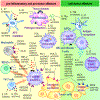Immunotherapy for colorectal cancer: insight from inherited genetics
- PMID: 38360438
- PMCID: PMC11096082
- DOI: 10.1016/j.trecan.2024.01.008
Immunotherapy for colorectal cancer: insight from inherited genetics
Abstract
Immunotherapy shows efficacy for multiple cancer types and potential for expanded use. However, current immune checkpoint inhibitors (ICIs) are ineffective against microsatellite-stable colorectal cancer (CRC), which is more commonly diagnosed. Immunotherapy strategies for non-responsive CRC, including new targets and new combination therapies, are being tested to address this need. Importantly, a subset of inherited germline genetic variants associated with CRC risk are predicted to regulate genes with immune functions, including genes related to existing ICIs, as well as new potential targets in the major histocompatibility complex (MHC) region and immunoregulatory cytokines. We review discoveries in the inherited genetics of CRC related to the immune system and draw connections with ongoing developments and emerging immunotherapy targets.
Keywords: GWAS; colorectal cancer; immune checkpoint inhibitor; immunotherapy; pharmacogenomics.
Copyright © 2024 Elsevier Inc. All rights reserved.
Conflict of interest statement
Declaration of interests The authors declare no competing interests.
Figures

References
-
- Chalabi M et al. (2020) Neoadjuvant immunotherapy leads to pathological responses in MMR-proficient and MMR-deficient early-stage colon cancers. Nat. Med 26, 566–576 - PubMed
-
- Overman MJ et al. (2018) Durable Clinical Benefit With Nivolumab Plus Ipilimumab in DNA Mismatch Repair-Deficient/Microsatellite Instability-High Metastatic Colorectal Cancer. J. Clin. Oncol 36, 773–779 - PubMed
Publication types
MeSH terms
Substances
Grants and funding
LinkOut - more resources
Full Text Sources
Medical
Research Materials

